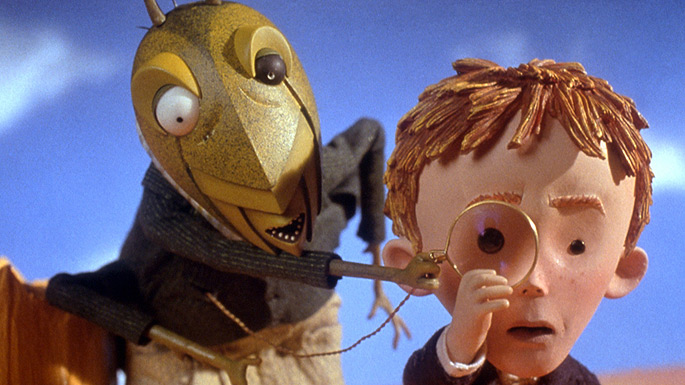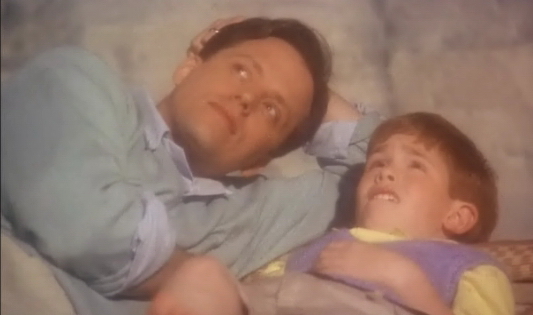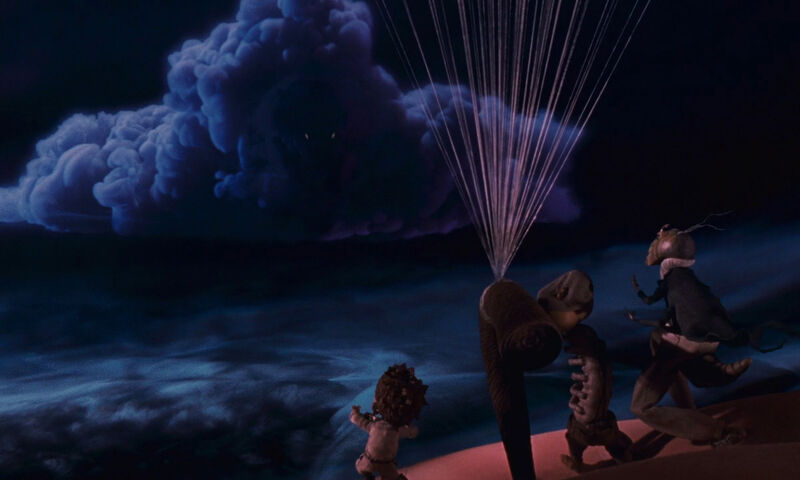Last Halloween I declared the del Toro's Hellboy movies the perfect Halloween movies and mentioned that, filmed in between those films, Pan's Labyrinth indicated an unprecedented growth for del Toro as a filmmaker and storyteller. I stand by that declaration.
In that article, I also mentioned that Pan's Labyrinth deserved its own review rather than just a passing mention. This is that review.
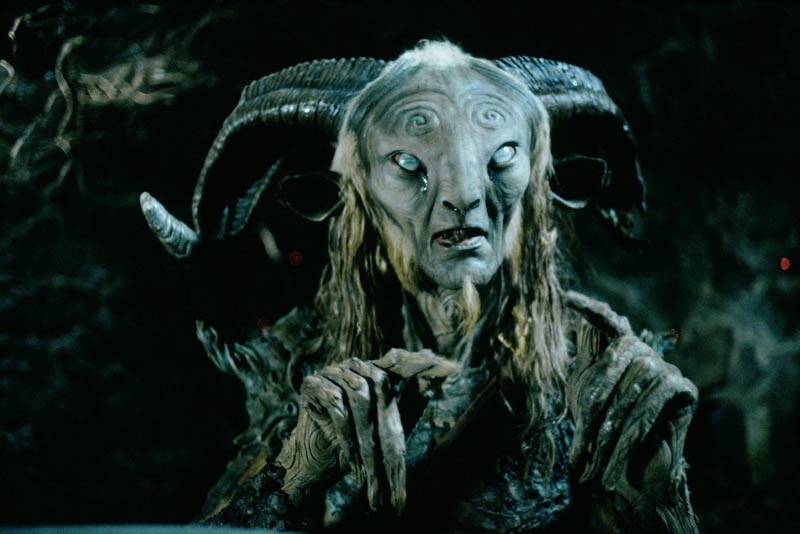 |
| "Wait, you mean this one?" |
Pan's Labyrinth is set in 1944 Francoist Spain, with the backdrop of World War II and five years after the Spanish Civil War. It's a stunning work that uses two narratives, one set in fantasy and one in war drama, to flesh out and parallel the other.
The narrative that gets all the attention is naturally the fantasy narrative which follows a young girl named Ofelia who discovers that she is the reincarnation of a long lost fairy princess after following a fairy into a labyrinth and talking to a faun.
I'll get to the fantasy narrative in a bit but for this article I'm gonna focus on the war drama. Mainly because I think the war drama stuff deserves some words devoted to it since it is really great and often doesn't get the attention the fantasy stuff does, probably because it is less visually iconic than the wondrous monsters which Ofelia faces and grace the film's posters.
 |
| The most popular poster features a magic uterus tree so it's obvious this is a film about resistance post-civil war Spain. |
To the surprise of everyone, about half of Pan's Labyrinth actually revolves around the Spanish Marquis resistance to the Francoist fascist regime and the brutal methods of control by the military during that regime.
Ofelia's step-father Vidal is a captain in the Falangist army hunting the Marquis in the forest and he is fantastic. Not in the sense I think the hunting of resistance fighters is fantastic but in the the sense that the character is such a great villain.
Now Vidal may seem cartoonish on first impression since he is so obviously evil with evil pouring out of his every evil action ever so evilly. He's just so violent and so merciless. A true psychopath he feels no remorse nor empathy but at the same time he dislikes killing without purpose. Not that he won't, just that he dislikes it because it wastes his time.
 |
| "You wanna know how I got this scar?" |
I think the thing with Vidal is that he is just so outright evil and a true sadist that he leaves a lasting impression. Like Amy Nicholson notes in The Canon episode on Pan's Labyrinth, there's just something about a bad guy who has his torture speech ready.
But there are other little touches too. There's his strict adherence to time and schedule (remembered I mentioned time earlier, it was literally just a couple of sentences ago). His obsession with his cracked pocket watch which he inherited from his father.
Which ties into his subscription to a very restrictive ideal of masculinity and obvious misogyny. Not to mention his vicious sadism. All of which on repeat viewings make it clear what a layered antagonist and perfect embodiment of fascist evil he is.
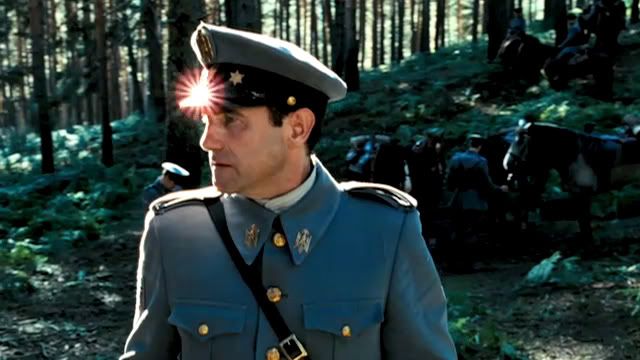 |
| Look how he sparkles with fascism in the sunlight. |
If I was really gonna get into it, we could see how his watch which he father cracked at the moment of his death both indicates how time, which he manages to a second, is actually beyond his control and how his version of dominant masculinity inherited from his father is itself broken.
But instead, let's move on to Mercedes and the good doctor Ferreiro. Both work under Captain Vidal but secretly help the Maquis. And both are interesting since they present a type of heroism not always seen or celebrated in cinema, that of the quiet objector.
The hero who cannot actively or violently stand up against the big bad but rather displays courage by putting themselves at risk within the enemy camp and who shows their heroism through their compassion and moral fortitude. And the film comments on how we don't often appreciate this type of bravery.
Maribel Verdú is amazing as Mercedes. There is a real sadness to her performance yet an undeniable strength to her character. Mercedes is a woman who is terrified of what she has to do and the danger she is in but does it anyway, The very definition of a hero.
And her version of femininity offers a clear contrast to the more passive submission of Ofelia's mother Carmen who has succumb to the fascist regime and Vidal's advances to bear his child and be the dutiful wife. Now the film positions this more as a difference between submission and rebellion but it's hard not to see Carmen's death in childbirth as a critique of that passive femininity.
However, it could be a comment on the destructive nature of fascism is such that the child of fascism's entry into this world brings with it the death of his mother. Or maybe that's reading too much into it. It's a bit hard to tell where to draw the line since the film invites such interpretations.
| "Oh really? Is that so?" |
What's interesting about the Maquis, which the film wants us to root for and are positioned as the good guys, is that they lost. There was a fascist regime in Spain until the 1970s. I'm assuming the film assumes the audience would be aware of the historical context in which case the film becomes a story about doing the right thing even if you might not win in the end.
Within that context, it is a film about not following orders in a time where not following orders was punishable by torture and death. Where any form of disobedience was deemed treason and treated as such.
Let's talk about disobedience since that is apparently the primary theme of the film. The Nerdwriter labelled the film a "disobedient fairy tale" and his is far from the only such reading of the film. Rightly so since the primary narrative climax of the film is when Ofelia right out disobeys both the Faun and Vidal.
However, while the theme of the film is disobedience is definitely apparent throughout the film, this seems to have resulted in the notion that Ofelia is subsequently a rebellious child. This is even though that reading of her character isn't really supported by the text of the film.
Now some may list the times where she disobeys or fails to follow instructions as acts of rebellion. Aaah, no. While she may be disobedient or negligent, this does not equate to being a rebel. Until the climax of the film, Ofelia never makes a stand in her disobedience which could make it rebellious.
For rebellion is not mere disobedience but rather is disobedience with a point, whether that point is to disrupt, to defy, or to create anarchy. To be rebellious there is a underlying reason behind that disobedience, a desire to resist authority, But we never get the sense from Ofelia that she wants to defy authority until the very end.
It just seems hard to swallow that Ofelia is some rebellious child throughout the movie when most of her acts of disobedience are done through carelessness or an act of selfishness rather than any real desire to resist authority,
That comes through far more strongly in the characters and actions of Mercedes and the doctor whose acts of disobedience are precisely acts of rebellion, flying in the face and in defiance of the authority of the Francoist regime.
To call Ofelia a rebel any point before the final act of the film seems to be projecting a rebellious spirit onto her character rather than that spirit being apparent in her character. I understand that this is a fable about disobedience but disobedience on its own does not a rebel make.
But this is still a fable and del Toro structures the film as such while at the same time playing with the conventions of a fable. In a traditional fable, the scene with the Pale Man (aka Eye-Ball Hands) would play out quite differently than it did in the film.
Ofelia is told not to eat anything on the table by the faun but then does. awakening the Pale Man. In a traditional fable, this would be a story about obedience and Ofelia would be eaten by the Pale Man as punishment for not following the rules. However in Pan's Labyrinth she gets away alive, even if she is berated by the faun for not following instructions.
It kinda turns the structure of a fable on its head (set up of lesson - thing done wrong - punishment to reinforce the lesson). You see this in the classic fable of The Tortoise and the Hare: cocky hare thinks he will win the race because he is the faster - due to his brashness he becomes complacent and takes a nap - tortoise wins the race through hard work and dedication. Easy set up and lesson: don't be cocky since slow and steady wins the race.
By setting up the convention of the fable but then playing with them, obviously partly due to narrative structure for a feature film, del Toro allows the story of Pan's Labyrinth to invoke the feel of fables but not constricted by their limitations.
And by having the fantasy scenes mirror the war drama scenes, del Toro is able to reiterate and reinforce the lesson of disobedience he wants to impart. This culminates in the climax of the film where Ofelia says no to both the Faun and Vidal in the same scene.
Pan's Labyrinth is a gorgeous and wonderful film which makes for perfect viewing this Halloween season. It might not be as terrifying as some straight horror film but features some legit scary monsters. It might not be as bloody as a gorefest but its violence is brutal and uncompromising. It might not be a Halloween movie but it is great to watch during Halloween.
Or any other time of the year for that matter.
References:
Pan's Labyrinth Wikipedia page
Falange Española Tradicionalista y de las Juntas de Ofensiva Nacional Sindicalista Wikipedia page
Pan's Labyrinth: Disobedient Fairy Tale - The Nerdwriter
The Esoteric Interpretation of “Pan’s Labyrinth” - The Vigilant Citizen
 |
| And then she becomes a princess because parents in the 1940s Spain punished their children a bit differently. |
However, while the theme of the film is disobedience is definitely apparent throughout the film, this seems to have resulted in the notion that Ofelia is subsequently a rebellious child. This is even though that reading of her character isn't really supported by the text of the film.
Now some may list the times where she disobeys or fails to follow instructions as acts of rebellion. Aaah, no. While she may be disobedient or negligent, this does not equate to being a rebel. Until the climax of the film, Ofelia never makes a stand in her disobedience which could make it rebellious.
For rebellion is not mere disobedience but rather is disobedience with a point, whether that point is to disrupt, to defy, or to create anarchy. To be rebellious there is a underlying reason behind that disobedience, a desire to resist authority, But we never get the sense from Ofelia that she wants to defy authority until the very end.
 |
| "Wait, you're not cool with me killing your baby brother with this knife so you can become a princess in a magic kingdom?" |
It just seems hard to swallow that Ofelia is some rebellious child throughout the movie when most of her acts of disobedience are done through carelessness or an act of selfishness rather than any real desire to resist authority,
That comes through far more strongly in the characters and actions of Mercedes and the doctor whose acts of disobedience are precisely acts of rebellion, flying in the face and in defiance of the authority of the Francoist regime.
To call Ofelia a rebel any point before the final act of the film seems to be projecting a rebellious spirit onto her character rather than that spirit being apparent in her character. I understand that this is a fable about disobedience but disobedience on its own does not a rebel make.
 |
| "Well, snapcrackles." |
But this is still a fable and del Toro structures the film as such while at the same time playing with the conventions of a fable. In a traditional fable, the scene with the Pale Man (aka Eye-Ball Hands) would play out quite differently than it did in the film.
Ofelia is told not to eat anything on the table by the faun but then does. awakening the Pale Man. In a traditional fable, this would be a story about obedience and Ofelia would be eaten by the Pale Man as punishment for not following the rules. However in Pan's Labyrinth she gets away alive, even if she is berated by the faun for not following instructions.
It kinda turns the structure of a fable on its head (set up of lesson - thing done wrong - punishment to reinforce the lesson). You see this in the classic fable of The Tortoise and the Hare: cocky hare thinks he will win the race because he is the faster - due to his brashness he becomes complacent and takes a nap - tortoise wins the race through hard work and dedication. Easy set up and lesson: don't be cocky since slow and steady wins the race.
| "Hahaha, you win the race? As if you could, you metaphor for steadfast dedication and hard work you." |
By setting up the convention of the fable but then playing with them, obviously partly due to narrative structure for a feature film, del Toro allows the story of Pan's Labyrinth to invoke the feel of fables but not constricted by their limitations.
And by having the fantasy scenes mirror the war drama scenes, del Toro is able to reiterate and reinforce the lesson of disobedience he wants to impart. This culminates in the climax of the film where Ofelia says no to both the Faun and Vidal in the same scene.
 |
| It works out really well for her. |
Pan's Labyrinth is a gorgeous and wonderful film which makes for perfect viewing this Halloween season. It might not be as terrifying as some straight horror film but features some legit scary monsters. It might not be as bloody as a gorefest but its violence is brutal and uncompromising. It might not be a Halloween movie but it is great to watch during Halloween.
Or any other time of the year for that matter.
References:
Pan's Labyrinth Wikipedia page
Falange Española Tradicionalista y de las Juntas de Ofensiva Nacional Sindicalista Wikipedia page
Pan's Labyrinth: Disobedient Fairy Tale - The Nerdwriter

